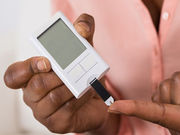In placebo controlled trial, no between-group differences in change in gastric emptying rate
MONDAY, Nov. 28, 2016 (HealthDay News) — For individuals with type 1 diabetes mellitus (T1DM), liraglutide therapy does not affect the rate of gastric emptying (GE) during hypoglycemia, according to a study published online Nov. 21 in Diabetes, Obesity and Metabolism.
Christian Seerup Frandsen, M.D., from the University of Copenhagen in Denmark, and colleagues examined the effect of the glucagon-like peptide-1 receptor agonist (GLP-1RA) liraglutide on counterregulatory responses and GE rate during hypoglycemia in individuals with T1DM in a 12-week randomized trial. Twenty patients aged older than 18 years and with glycated hemoglobin ≥8 percent were randomized to liraglutide once daily or placebo as add-on to insulin treatment. A hypoglycemic clamp was carried out followed by a liquid meal before and at the end of treatment.
The researchers observed no significant between-group differences in the changes in GE rates after 12 weeks of treatment (P = 0.96); no significant changes were seen from baseline whether assessed by area under the acetaminophen curve or time to peak. Similar between-group results were seen in secondary end points, including glycemic recovery, counterregulatory hormone responses, systolic blood pressure, and GLP-1 and pancreatic polypeptide responses. There was an increase in heart rate with liraglutide (69 ± 4 to 80 ± 5 beats/min; P = 0.02).
“Liraglutide does not compromise glycemic recovery, GE rate, or counterregulatory hormone responses in type 1 diabetes during hypoglycemia,” the authors write.
Several authors disclosed financial ties to pharmaceutical companies, including Novo Nordisk, which funded the study.
Full Text (subscription or payment may be required)
Copyright © 2016 HealthDay. All rights reserved.








